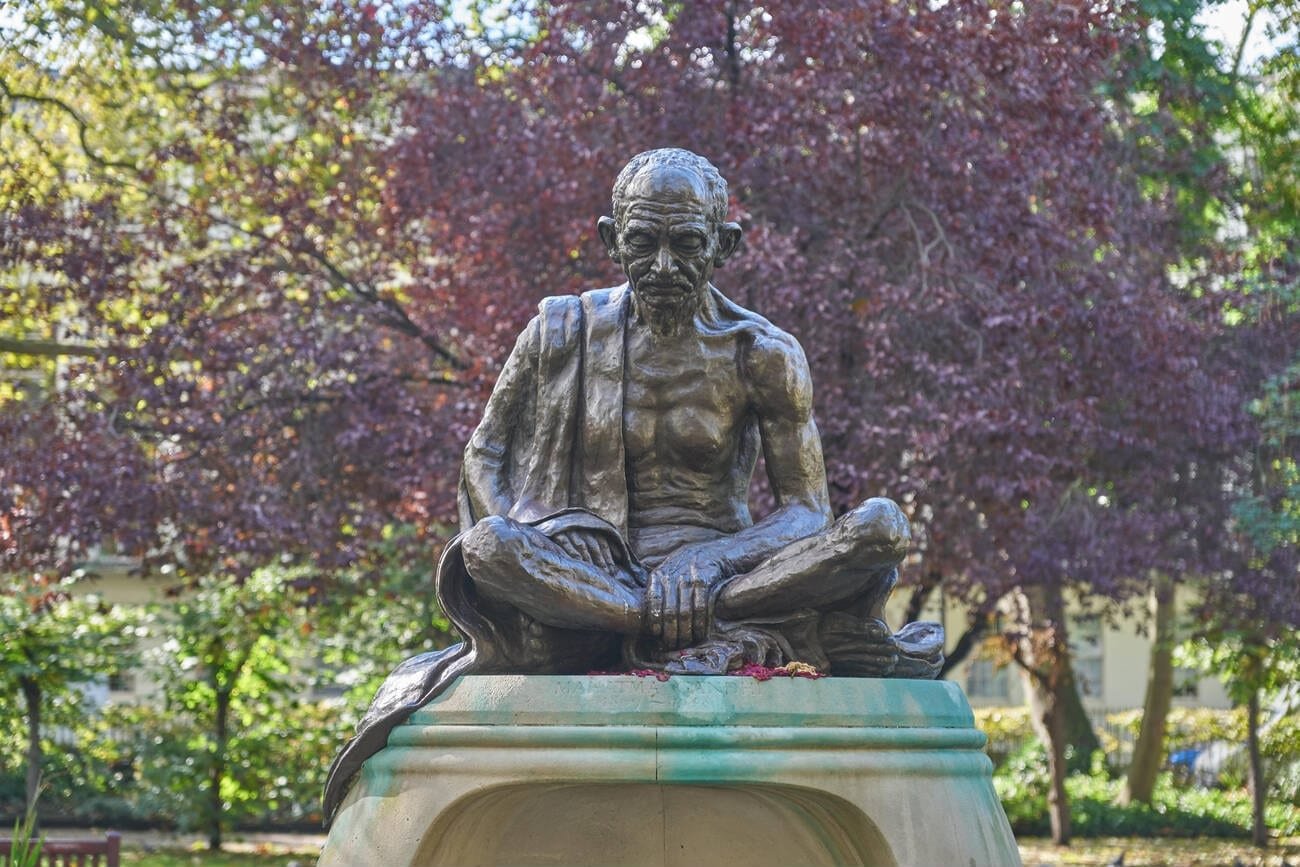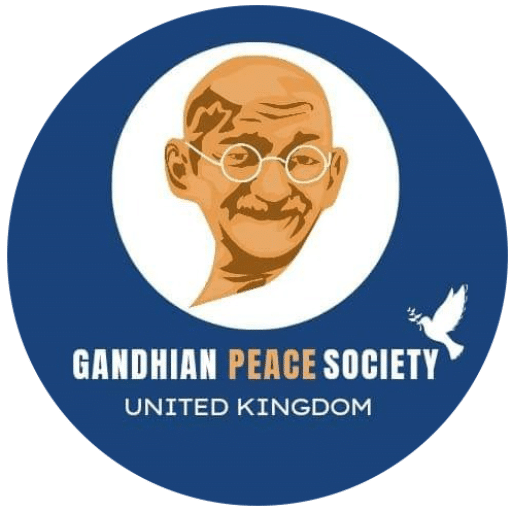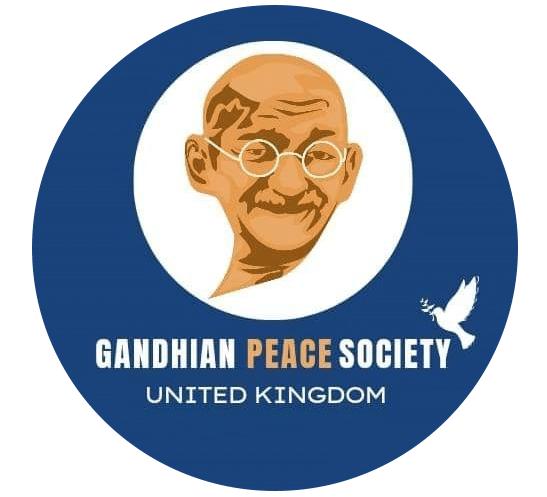
Promoting Peace in the Face of Conflict Gandhian Principles for Europe and the Israel-Gaza Region
Anuranjan Jha (Chairman and president), Dhruva Kumar (General Secretary- Gandhian Peace Society)
(Gandhian Peace Society, SC052875 is an official registered charity in the United Kingdom, the first of its kind in Scotland. The mission of the Gandhian Peace Society is to promote the idea that non-violence is the most effective means of achieving social change. The organisation accomplishes this mission through various programs and initiatives, including educational programs, community outreach, and advocacy.)
The call for peaceful resolution echoes louder than ever in a world marked by persistent conflict. As Europe grapples with geopolitical tensions and the Israel-Gaza conflict continues to cast a shadow over the region, the Gandhian Peace Society, a UK charity, advocates for the adoption of Gandhian principles to pave the way for a more peaceful future.
The Gandhian Peace Society, a UK charity named after the renowned advocate of non-violent resistance, Mahatma Gandhi, has been at the forefront of advocating for the adoption of these principles as a means to achieve lasting peace in the midst of war. With a focus on non-violence, truth, and dialogue, Gandhian principles offer a compelling framework for conflict resolution that is rooted in empathy, understanding, and mutual respect.
The use of Gandhian principles as a means to achieve peaceful resolution is backed by a wealth of historical data and facts, demonstrating the effectiveness of non-violent resistance and dialogue in resolving conflicts. This approach has the potential to not only de-escalate ongoing tensions in Europe and the Israel-Gaza region but also to foster long-term reconciliation and stability.
A Global Perspective on Conflict
The Gandhian approach has seen success in various global conflicts, ranging from South Africa’s struggle against apartheid to the People Power Revolution in the Philippines. These historical instances serve as compelling evidence of the efficacy of non-violent resistance and dialogue in effecting tangible change and building bridges between conflicting parties.
1. Europe’s Geopolitical Landscape:
In the context of Europe, adopting Gandhian principles can pave the way for inclusive dialogue, reconciliation, and establishing frameworks for addressing underlying grievances. By prioritising non-violent resistance and constructive engagement, European nations can create the conditions for durable peace, fostering a future free from conflict and division.
- According to the Global Peace Index 2022, while generally peaceful, Europe has faced challenges with regional conflicts and geopolitical tensions.
- Adopting Gandhian principles in European diplomacy could offer a non-violent, dialogue-centered approach to addressing underlying issues.
2. Israel-Gaza conflict:
Similarly, in the Israel-Gaza region, the application of Gandhian principles holds the potential to break the cycle of violence and retaliation, providing a pathway for both Palestinians and Israelis to engage in meaningful dialogue and seek common ground. This approach can pave the way for resolving longstanding grievances, recognizing shared humanity, and emerging a future where both communities can coexist in peace and security.
- The Israel-Gaza Conflict has endured for decades, resulting in human suffering and geopolitical instability.
- Statistics from the United Nations Office for the Coordination of Humanitarian Affairs (OCHA) show the impact on civilians, highlighting the urgent need for a peaceful resolution.
Gandhian Principles for Peaceful Resolution
As the call for peaceful resolution gains traction, leaders and stakeholders in Europe and the Israel-Gaza region must heed the lessons of history and recognise the transformative potential of non-violent resistance and dialogue. By embracing Gandhian principles, nations can chart a course towards a future characterised by mutual understanding, cooperation, and enduring peace.
1. Non-Violence as a Guiding Force:
- Mahatma Gandhi’s philosophy emphasizes non-violence as a powerful means to achieve social and political change.
- The Gandhian Peace Society urges nations involved in conflicts to consider non-violent alternatives, fostering a culture of dialogue and reconciliation.
2. Dialogue and Diplomacy:
- Statistics from the Stockholm International Peace Research Institute (SIPRI) emphasize the importance of diplomatic efforts in resolving conflicts.
- Gandhian principles advocate for sincere dialogue as a foundation for lasting peace, encouraging nations to engage in meaningful conversations to address root causes.
3. Humanitarian Concerns:
- The Israel-Gaza Conflict has resulted in a humanitarian crisis with significant impacts on civilian populations.
- Gandhian ideals stress the importance of compassion and empathy, urging involved parties to prioritize the well-being of all individuals affected by the conflict.
The Role of the Gandhian Peace Society
The Gandhian Peace Society, through its research and advocacy efforts, has compiled data indicating that non-violent resistance campaigns are twice as likely to achieve their goals as their violent counterparts. Furthermore, these campaigns often lead to longer-lasting and more sustainable outcomes, creating a foundation for genuine reconciliation and peacebuilding.
1. Advocacy for Non-Violent Solutions:
- The Gandhian Peace Society actively promotes Gandhian principles in conflict resolution, urging governments and international bodies to consider non-violent alternatives.
2. Building Bridges for Dialogue:
- By fostering dialogue platforms and initiatives, the Gandhian Peace Society works towards creating spaces where conflicting parties can engage in constructive conversations.
The Path Forward
As Europe navigates geopolitical challenges and the Israel-Gaza region seeks a way to break the cycle of conflict, embracing Gandhian principles offers a promising path forward. Non-violence, dialogue, and humanitarian considerations form the bedrock of a sustainable and just peace.
In the spirit of Mahatma Gandhi’s enduring wisdom, our collective responsibility is to work towards a world where conflicts are resolved through understanding, compassion, and the unwavering commitment to building a future free from violence and strife. The Gandhian Peace Society’s call to adopt these principles stands as a beacon of hope, urging nations to choose the path of peace over the shadows of conflict.
In conclusion, the adoption of Gandhian principles as advocated by the Gandhian Peace Society represents a transformative approach to achieving a peaceful resolution in Europe and the Israel-Gaza conflict. Backed by historical evidence and empirical data, this approach offers a compelling alternative to the cycle of violence and animosity, pointing towards a future defined by reconciliation, understanding, and lasting peace.
If you are interested in learning more about the Gandhian Peace Society or want to get involved in its work, you can visit its website Gandhi.Foundation
Follow us on Facebook, Twitter and LinkedIn:
Facebook page: https://www.facebook.com/GandhianPeaceSociety/
Twitter Page: https://twitter.com/GandhianPeaceUK
LinkedIn: https://www.linkedin.com/in/gandhianpeacesociety/
Or contact its email address at Info@gandhi.foundation
You can also subscribe to its newsletter to receive updates and invitations for upcoming events and activities.
The Gandhian Peace Society is a charity for non-violence and harmony that strives to help establish a world founded on truth, ahimsa, peaceful coexistence, and love for labour.
Join us today and be part of this noble and inspiring cause.
All Categories
Recent Posts
Scottish Parliament Group Endorses Groundbreaking Hinduphobia
Revitalising Global Governance: The Gandhian Paradigm
Tags
Sign up for news updates
+44 7404 405230
info@gandhi.foundation




